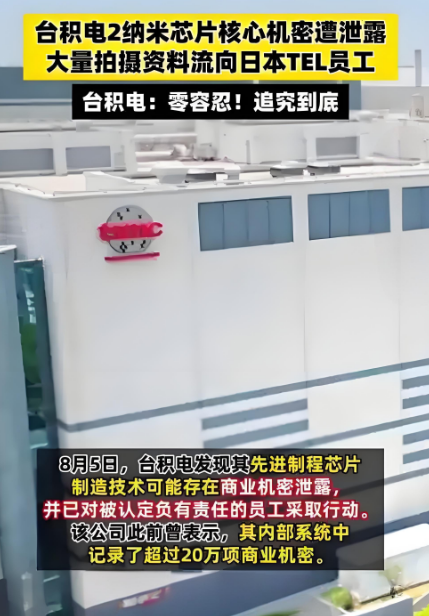TSMC Hit by Major Technology Leak! 2nm Chip Secrets Suspected Flowing to Japan
According to a report from Taiwan's "Central News Agency" on August 5, 2025, TSMC (Taiwan Semiconductor Manufacturing Company) revealed that engineers are suspected of stealing confidential technology related to its 2nm process. Following an investigation, Taiwanese prosecutors applied to the court for the detention without bail of three suspects, which was approved. As Taiwan's "National Science and Technology Council" (NSTC) has already included IC manufacturing technologies below 14nm on Taiwan's list of core critical technologies, the Council stated on the 5th that if core critical technology trade secrets are stolen, prosecutors will investigate according to regulations, with penalties including up to 12 years in prison and fines of up to NT$100 million (approximately US$3.1 million).
This case has been officially classified as Taiwan's first business secret leakage case involving "national core critical technologies," shaking the global semiconductor industry.
Thousands of Tech Photos Mysteriously Leaked, Engineer Methods Exposed
TSMC discovered anomalies during routine internal monitoring: some employees frequently accessed highly confidential documents, triggering the alarm system. The company subsequently launched an investigation and found that key technical data for the 2nm process had been illegally obtained. Nine individuals were involved, including six from the R&D center and three pilot production engineers.
Three of the pilot production line employees, while working from home, used company-issued laptops to log into the internal system and took photos of process parameters and integration technology with their personal mobile phones – over 400, even up to a thousand photos – to bypass digital monitoring systems.
Even more astonishingly, some individuals were caught openly photographing confidential documents at a Starbucks next to the Hsinchu Science Park, where they were apprehended on the spot by investigators.
The other six R&D personnel were removed from core positions and are under investigation for improperly providing technical data.

Japanese Firm's Role a Mystery, Rapidus' Technological Leap Raises Eyebrows
The leaked data is suspected to have flowed to Japanese equipment giant Tokyo Electron Limited (TEL). A former TSMC employee surnamed Chen, who previously worked in the system integration department and later moved to TEL, is suspected of obtaining these confidential 2nm images through his former colleague network.
TEL is no ordinary company – it is not only a long-term equipment supplier to TSMC but also a shareholder and technical partner of Japan's state-backed semiconductor champion, Rapidus. Rapidus suddenly announced on July 18, 2025, that its Hokkaido factory had successfully trial-produced 2nm chips, becoming the first Japanese company to break through this technological barrier.
The timing is highly sensitive: less than a month passed between Rapidus claiming a "breakthrough in EUV equipment deployment" and the exposure of the TSMC leak. Although Rapidus has not responded to questions about any connection, the coincidence has sparked strong speculation within the industry.
Why Does 2nm Affect National Security?
2nm represents the pinnacle of current semiconductor manufacturing processes. TSMC plans to mass-produce this technology by the end of this year, promising a 10%-15% performance increase over 3nm and a 25%-30% reduction in power consumption. It represents the culmination of over ten billion US dollars in R&D investment and the integration of thousands of patents.
In December 2023, Taiwan's Executive Yuan explicitly designated "processes below 14nm" as national core critical technologies, protected under the "National Security Act." Illegal disclosure carries a maximum penalty of 12 years in prison and a NT$100 million fine. Prosecutors handling this case under this serious crime statute highlight that its severity far exceeds ordinary commercial espionage.
Following the incident, TSMC took swift action
- Fired the three engineers most deeply involved and referred the entire case to the judiciary;
- Issued a statement emphasizing "zero tolerance" for leaks and committing to continuously strengthening internal control mechanisms;
- Taiwanese prosecutors simultaneously searched TEL's Hsinchu Science Park office to investigate whether the data flowed overseas.
TSMC Chairman C.C. Wei has previously stated that its technology is "hard to replicate" because manufacturing requires massive accumulated experience. However, experts warn that if competitors obtain key data such as yield tuning parameters, it could shorten their R&D process by 2-3 years, holding significant strategic value for competitors like Samsung, Intel, and Rapidus.
TSMC's stock price fell by NT$25 today, while TEL's shares also plunged by 4% at one point. The weakening of technological barriers could alter the industry ecosystem: if TSMC's leading position in advanced processes is challenged, its dominance in AI chip foundry could change.
More profoundly, this case reveals that geopolitical technological competition has entered a white-hot phase of "espionage offense and defense" – as the US initiates investigations under Section 232 on semiconductors and Japan accelerates domestic production, core technologies have become national-level strategic assets.



